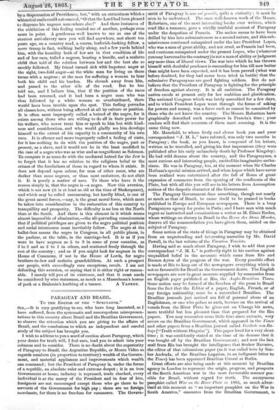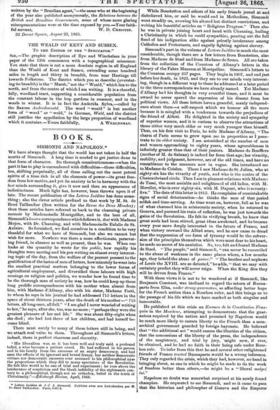PARAGUAY AND BRAZIL.
To THE EDITOR OF THE " SPECTATOR."
SIR,—It is very gratifying to me, who have long lamented, as I have suffered, from the systematic and unscrupulous misrepresen- tations in this country about Brazil and the Brazilian Government, to observe the attention which you are giving to the affairs of Brazil, and the conclusions to which an independent and careful study of the subject has brought you.
I wish to address to you a word of caution about Paraguay, which your desire for truth will, I feel sure, lead you to admit into your columns and to consider. There is no doubt about the superiority of Paraguay to Brazil, the Argentine Republic, or Monte Video as regards numbers (in proportion to territory) wealth of the Govern- ment, and material appliances and improvements which wealth can command ; but the President of Paraguay is, under the forms of a republic, an absolute ruler and extreme despot ; it is an iron Government at home, industry is repressed, trade checked, every individual is at the mercy of the President and in fear of him, foreigners are not encouraged except those who go there to be servants of the Government for high pay ; there are no foreign merchants, for there is no freedom for commerce. The Govern- meat of Paraguay is one sui yeileril, quit; a curiosity ; it Inuit lie seen to be understood. The once well-known work of the Messrs. Robertson, one of the most interesting books ever ivritteu, which read like a romance, gave a vividly truthful account of Paraguay under the despotism of Francia. The nation seems to have been drilled by him into submissiveness as a second nature, and this sub- missiveness continued unimpaired under the late President Lopez, who was a man of great ability, and not cruel, as Francia had been, and continues unimpaired under the present Lopez, who (whatever youmay haveread to the contrary) is not a manof ability or judgment any more than of liberal views. The war into which he has thrown himself with doubtful prudence is succeeding for him till now better than might have been expected, and it has been proved (what was before doubted, for they had never been tried in battle) that the submissive Paraguayans are good fighting soldiers. But do not believe that the President of Paraguay is fighting for the principle of freedom against slavery. It is all ambition. The Paraguay nation excels at present only for her ambition and glorification. The national Congress which was lately assembled for a few days, and to which President Lopez went through the forms of asking for powers and money, was a farce such as cannot be conceived by those who do not know the country. The Messrs. Robertson have graphically described such congresses in Francia's time ; your readers will find their accounts of them most amusing. It is the same thing now.
Mr. Mansfield, to whose lively and clever book you and your correspondent "J. M. L." have referred, was only two months in Paraguay ; the book, as you know, is composed of his letters, written as he travelled, and giving his first impressions (they were published after his early melancholy death by Professor Kingsley). He had wild dreams about the country, and the Paraguayans, a most curious and interesting people, excited his imaginative enthu- siasm. He was in Paraguay, too, at the moment when Sir Charles Hotham's special mission arrived, and when hopes which have never been realized were entertained after the fall of Roses of great expansion of commerce from the opening of the confluents of the Plate, but with all this you will see in his letters from Assumption notices of the despotic character of the Government.
The Paraguay Government does something, though not nearly so much as that of Brazil, to cause itself to be praised in books published in Europe and European newspapers. There is a busy Paraguayan agency for praise in Paris ; and I have seen with much regret so instructed and conscientious a writer as M. Elisee Reclus, whose writings on slavery in Brazil in the Revue des Deux Mondes, deserve all the commendation you have given them, misled on the subject of Paraguay.
Some notion of the state of things in Paraguay may be obtained frinn an unpretending and interesting narrative by Mr. David Powell, in the last volume of the Vacation Tourists.
Having said so much about Paraguay, I wish to add that your correspondent "J. M. L." is perfectly right in his caution against unqualified belief in the accounts which came from Rio and BUenos Ayres of the progress of the war. Every possible effort is made at Rio to keep out of the newspapers everything which is not so favourable for Brazil as the Government desire. The English newspapers are now in great measure supplied by summaries from
an English paper published at Rio, the Anglo-Brazilian Times. Some notion may be formed of the freedom of the press in Brazil
from the fact that the Editor of a paper, English, French, or of any foreign nationality, must be a naturalized Brazilian. The Brazilian journals just arrived are full of personal abuse of an Englishman, or one who pa§ses as such, because on the arrival of vessels from the River Plate he gives out on 'Change his news, more truthful but less pleasant than that prepared for the Rio papers. You may remember some little time since extracts, very
severe on the Brazilian Government, which appeared in the Times and other papers from a Brazilian journal called Verdade sem Ra- bo0 ["Truth without Disguise"). This paper lived for a very short time ; it was confidently stated at the time of its decease that it was bought off by the Brazilian Government ; and now the hint mail from Rio has brought the intelligence that Senhor Navarro, the editor of that calumnious paper (as it was called hero by Sen- hor Andrade, of the Brazilian Legation, in an indignant letter to the Times) has been appointed Brazilian Consul at Berlin.
Great efforts are also being made at this moment by Brazilian agency in London to represent the origin, progress, and prospects of the South American war in the most favourable manner pos-
sible for Brazil, without regard for truth. The anonymous pamphlet called War on the River Plate in 1865, so much adver-
tised at this moment as " an important pamphlet on the War in South America," emanates from the Brazilian Government, is
written by the " Brazilian agent,"—the same who at the beginning of the year also published anonymously, the Relations between the British and Brazilian Governments, some of whose more glaring misrepresentations were at the time exposed by you.—Your faith- ful servant, W. D. CHRISTIE. 32 Dorset Square, August 23, 1865.































 Previous page
Previous page